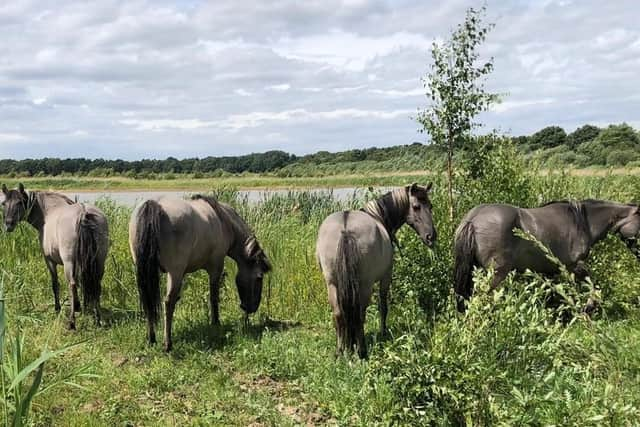Our little ponies – amazing grazers arrive at Doncaster's Potteric Carr nature reserve
and live on Freeview channel 276
The Trust’s four grey-and-white ponies are all female and aged between ten and 16 years old arrived from Kent Wildlife Trust this week.
The Trust have enlisted the help of ponies and other grazing animals, but this is the first time this breed has helped the Trust.
Advertisement
Hide AdAdvertisement
Hide AdKoniks are particularly suited to wetland areas and preventing the marshland from overgrowing. They will create new habitat for ground-nesting birds through their gentle grazing.


Charlotte Dring, conservation grazing manager, said: “The Koniks will be in the Huxter Well Marsh area, which is too wet for cattle to graze. Ponies graze close to the ground and the nooks and crannies, which will improve the long term health of the reedbed.
"They eat selectively - sedges, coarse grasses, rushes and bark, but also nibble at bits like nettles, thistles and docks. which will keep them in check to allow other flowers and plants to come through.”
If the trial at Potteric Carr goes well, there’s potential to introduce grazing ponies to some of the Trust’s other wetland reserves too.
Advertisement
Hide AdAdvertisement
Hide AdCharlotte added: “I went to see how Kent Wildlife Trust were grazing with different breeds and saw and talked to colleagues about the benefits that Koniks have. Sharing expertise between our family of Trusts around the UK is invaluable and works very well. I’ve been picking up bits of information from other Wildlife Trusts, talking to other livestock managers. We have an incredible support network.”
Yorkshire Wildlife Trust has already seen the benefits of grazing on some of its reserves, along with encouraging results from trialling cutting-edge GPS collar technology to guide livestock to sustainably graze reserves where this wasn’t previously possible.
Grazing with cattle and sheep can help grassland reserves like Wheldrake Ings and Spurn become more vibrant and diverse; an increase in flowers and plants means more food for a wider variety of insects, pollinators, birds and bats.
Potteric’s Konik ponies will live as wild ponies, but with regular checks from the vet and farrier. They may be spotted in areas away from the reserves main footpaths.
In these confusing and worrying times, local journalism is more vital than ever. Thanks to everyone who helps us ask the questions that matter by taking out a subscription or buying a paper. We stand together. Dominic Brown, editor.
Comment Guidelines
National World encourages reader discussion on our stories. User feedback, insights and back-and-forth exchanges add a rich layer of context to reporting. Please review our Community Guidelines before commenting.
